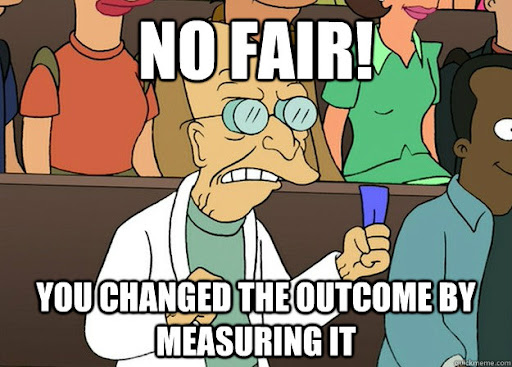AFib patients using wearable devices are more likely to engage in high rates of symptom monitoring and experience anxiety than non-users, a study shows.

Perfect use of this meme
AFib patients using wearable devices are more likely to engage in high rates of symptom monitoring and experience anxiety than non-users
Well no shit—how can non-users engage in high rates of symptom monitoring if they don’t have symptom monitors?
deleted by creator
Elevated heart rate is a symptom, one that is quantifiable and monitorable.
“Tachycardia” is a sign. “Palpitations” or “heart racing” are symptoms. Signs are the objective things that can be measured and recorded as hard data. Symptoms are what the patient reports feeling that are not measurable. In taking a history and physical, the symptoms tell the physician what signs to look for.
Correlation or causation?
People that are more anxious about AFib might be more likely to buy a device to monitor it.
I bought an Apple Watch for anything but fitness. If I happen to get a little anxiety, the watch will pipe up to mention something about my heart rate, and that usually just makes the anxiety worse.
OR, are people that monitor symptoms and stress about it more likely to buy a wearable that allows them to do that?
“Oh my SPO2 is dangerously low, at 82%?”
*adjusts watch to be a bit tighter*
SPO2 back to 98%
So yeah I do monitor it moreso than without, but understanding the limits of the tech, hasn’t made me more worried. Bought one to record sleep schedule. Works very well for that.
82 is a bit below dangerous I’d say, especially if the wearer is unconscious.
If the wearer can see that value and understand it, it’s probably a hardware failure.
That was my reasoning exactly.
The sensors are decent enough for something that cost less than 50 euro, but clearly there’s room to improve.
Good contact is quite fickle if there are any obstructions or even dirt on the skin, but my experience are mostly with the fingertop or earlobe sensors which are quite sensitive due to only using a red led. Does the wrist one use another kind of tech?
Yes, I agree.
Which is why I only got one after being declined from a sleep clinic for absurd reasons.
Mine uses a green light, but afaik it’s more or less the same as hospital ones. Just cheaper shit. Like how an aeroplane and a paperplane are technically both aircraft. You could study aerodynamics with paper aeroplanes, but it’s gonna be much easier if you don’t have to resort to that but can actually study the knowledge available to make reasonable choices.
the public healthcare here just plain up denied my referral from a psychiatrist. despite more than 20 years of sleep problems. if I could meet the person who made that decision, I’d have a few strongly selected words to tell them
It’s more to do with me not keeping the wrist strap actually the tightest it would go, because it’s annoyingly squeezing then.
Sometimes, on some angles, there will be a bit of space between the sensor and my skin which would explain the bad reading.
Pretty sure the tech is more or less the same tech as in the basic rubber thing that gets put on your finger at hospital. Except those alway used red imo, not green. But idk. I don’t really need the SPO2 feature so I don’t mind.

Thanks for indulging my curiosity :)
My pleasure.
Understanding the limits of the tech is key - I don’t equate the sleep tracking to the quality of the same I’d receive in a sleep lab, but I do value understanding my perception of sleep quality (i.e., totally subjective and rarely valid) vs the partially objective tracking I get from the watch.
I think I responses to the wrong comment, here’s the reply:
Yes, I agree.
Which is why I only got one after being declined from a sleep clinic for absurd reasons.
Mine uses a green light, but afaik it’s more or less the same as hospital ones. Just cheaper shit. Like how an aeroplane and a paperplane are technically both aircraft. You could study aerodynamics with paper aeroplanes, but it’s gonna be much easier if you don’t have to resort to that but can actually study the knowledge available to make reasonable choices.
the public healthcare here just plain up denied my referral from a psychiatrist. despite more than 20 years of sleep problems. if I could meet the person who made that decision, I’d have a few strongly selected words to tell them
If anything I have the opposite with my garmin watch that shows my heart rate. I’ve gotten used to seeing what my heart rate does just before I have a panic attack. This has really helped me ‘catch’ myself before it happens and calm myself down. I’ve not had one for over 2 years.
In a similar vain, I tried out a garmin smartwatch for a while, and at some point it warned me I was getting stressed.
I wasn’t though - I was excited about a project that I had been working on coming together. But apparently the watch could only think in negative moods.
For that, and other privacy and usability based reasons, I decided to return it and go back to my non-heart-rating Pebble Time Steel.
This article is a great example of the post hoc fallacy; it’s more likely that people anxious about their heart condition are purchasing wearable monitors at an elevated rate compared to the rest of the population
Seems to me that these people are being conscious about their health, and that’s somehow a bad thing.
There’s consciousness, and then there’s anxiety inducing obsessive symptom checking. Which may do more harm than good given these are cardiac patients.
Everything in moderation.
Surely we van look at apps that allow more informed data but without the anxiety. Like, here’s your data, this is less frequent than average. Or, here is your data, its the same as before. Or here is your data, its slightly different again, so we’ve already notifies your doctor, but usually this is nothing to be concerned about. Etc.
Lots of patients with other conditions have yo do similar, like diabetics monitoring sugar levels. Or asthmatics who can induce attacks by getting stressed about attacks.
We could build in some mindfulness exercises which help with anxiety. I’d say overall, its better.
It may also be when they were asked. I monitor whatever my watch allows, and plan to base future Watch decisions mostly on new health monitoring.
With each new capability, I obsess about it for a while until it fades into the background. Now I check them all once in a while but the bad part is I don’t follow them closely enough to improve my well-being. There’s a balance somewhere between my tendencies and people who don’t stop
It’s more that these people are addicted to knowing if they are dying or not. Compulsively overchecking to the point of detriment.
I personally sometimes experience a lot of PVCs. I obsess over getting a good reading to be able to show my doctor. It also becomes impossible to tell yourself it’s all in your head. My son is a nurse and I know the point at which PVCs go from uninteresting to concerning. At least I know they are never really urgent.
But my primary anxiety comes from my heart not working the way it’s supposed to and being able to feel irregular heartbeats. I take peace in being able to see for myself that they aren’t frequent enough to be overly concerned. But they are a reminder I’m not going to be around forever, that’s for sure.
Weird that I actually do have heart rythm problems and a couple of different monitors, but I don’t actually think about it unless I’m symptomatic.
I disabled those warnings on my smartwatch because they made me worry and it worked like a vicious circle. The more they say high heart rate or something the more I was unable to calm myself down.
Can see them being useful but yeah not for me.
That makes sense. I don’t have a fitness watch but I guess I could apply this to other areas of my life. Maybe there’s a useful and more general theory to be found.
Sort of like how after you walk off a cliff, you don’t start falling until you look down.









